Hezbollah Loses Parliamentary Seat In Its South-Lebanon Stronghold
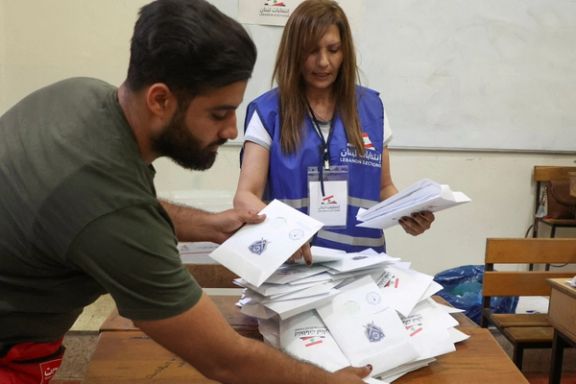
Iran-backed Hezbollah lost a seat in its south Lebanon stronghold to a candidate backed by opposition groups in parliamentary polls on Sunday.

Iran-backed Hezbollah lost a seat in its south Lebanon stronghold to a candidate backed by opposition groups in parliamentary polls on Sunday.
An opposition candidate and two Hezbollah officials confirmed the result, citing preliminary results.
Two Hezbollah officials said Elias Jradi, an eye doctor running on the opposition-backed "Together Towards Change" list, won an Orthodox Christian seat previously held by Assaad Hardan of the Syrian Socialist Nationalist Party, a close Hezbollah ally who has been an MP since 1992.
Jradi told Reuters his list had secured enough votes to win one seat, an opposition breakthrough in an area dominated by the Iran-backed group and its allies, but would not confirm it would go to him before results were finalized.
Shi'ite Muslim Hezbollah and its allies are expected to retain control of the remaining 10 seats in the district, the Hezbollah officials said.
The election for the 128-member parliament is the first since Lebanon collapsed into economic crisis in 2019. Results are expected to emerge through the night.
Opposition candidates are mainly from leaders of protests that rocked Lebanon in 2019, aimed at a political elite that has controlled politics in the small but strategic country for decades, eventually leading the economy into disintegration. Hezbollah has dominated the sectarian political landscape in the past decade.
Hezbollah and its allies won a majority in 2018.
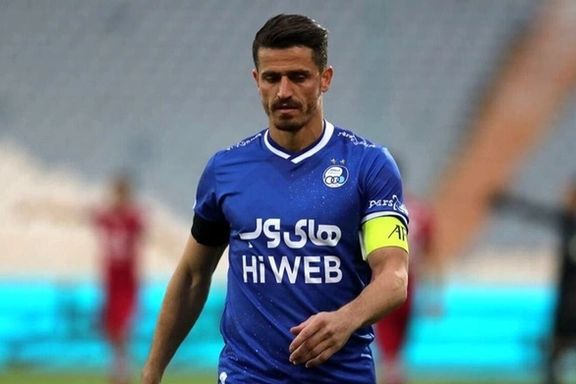
A popular Iranian footballer has rebuked the Islamic Republic’s authorities for their handling of recent protests that was sparked by a sudden rise in prices.
Veria Ghafouri, the captain of Tehran's Esteghlal football (soccer) club, said on the sidelines of a match against Foulad club on Saturday that “It is the right of the Iranian people to live a happy life".
The national team player, who has time and again spoken out against the government and in support of people protesting social and economic issues, added, "I do not know, are the officials not ashamed to see this situation?"
Ghafouri said that when it comes to social and civic issues, football is no longer his priority, and he uses his position to express the demands of his fans.
Following days of unrest across Iran, the match between Esteghlal and Foulad was held without spectators in Ahvaz, the provincial capital of Khuzestan that was the hotbed of the protests which then spread to several other cities.
Other celebrities are also reacting to the protests and the clamp down by security forces.
Iranian actor Ali Nassirian tacitly criticized the current situation of the country during a ceremony at Tehran’s City Theater on Saturday night, saying that holding such celebrations is beyond the people’s patience and spirit. "In such circumstances, we should not celebrate when our people are not in a good mood, we could talk instead of playing music," he added.
Iranian dissident director Jafar Panahi recently said violence is the solution of despots, describing the poverty in Iran as a result of “incompetent rulers”.
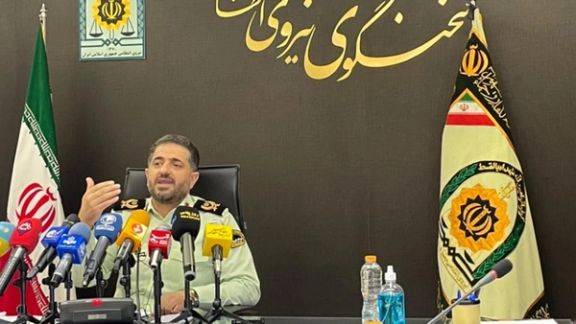
Iran’s Police spokesperson says the volume of goods being trafficked from and to the country is so high that cannot be carried out by individual smugglers.
Brigadier General Mehdi Hajian said in a press conference on Sunday that 3.3 million liters of vegetable oil, over 5.3 tons of wheat and flour, 3.3 thousand tons of rice, and 2.7 thousand tons of animal feed have been discovered and confiscated from smugglers and hoarders during the past two months.
He added that 1,284 people have been arrested in connection with the smuggling, noting that the total value of the confiscated goods is estimated to be about 9,000 billion rials (about $30 million).
Saying that such figures are alarming, he called for more efficient regulations and supervision over the supply chains, implying that such amounts of goods can only be smuggled through organized crime or with the help of the authorities.
Hajian also said the volume of goods trafficked to the country is also too high to be the work of individual smugglers via border crossings.
In February, the head of Iran’s Headquarters for Combating Smuggling of Goods and Foreign Exchange said the volume of smuggled goods is at least $12.5 billion and only one-third of the goods involved is discovered.
Ali Moayedi Khorramabadi noted that due to political conditions and economic sanctions imposed on the Islamic Republic, trade is not conducted in accordance with international laws, therefore a lot of commodities are smuggled in or out of the country.
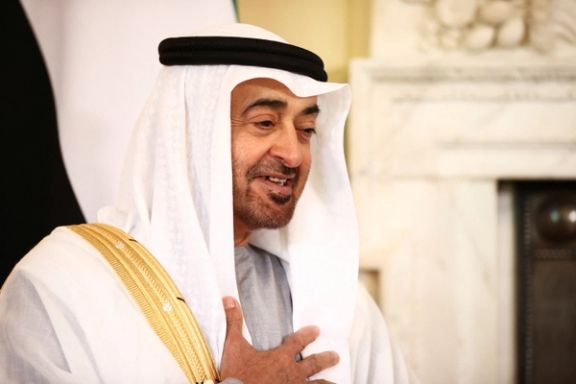
Sheikh Mohammed bin Zayed al-Nahyan, the de facto leader of United Arab Emirates widely seen as forging an anti-Iran axis with Israel, is the new UAE president.
In a consolidation of his leadership, Sheikh Mohammed, known as ‘MbZ,’ was appointed unanimously Saturday by the UAE federal council a day after the death of his half-brother President Sheikh Khalifa bin Zayed, 73. Sheikh Mohammed succeeded Sheikh Khalifa as ruler of Abu Dhabi on his death May 13.
"We congratulate him and pledge allegiance to him as do our people," said Dubai ruler Sheikh Mohammed bin Rashid al-Maktoum, UAE vice-president and premier.
At 61, MbZ became a strong figure in a growingly assertive UAE foreign policy after the regional defeat of the ‘Arab Spring’ in 2011, including armed interventions in Libya and Iraq, and in supporting military rule in Egypt, which the UAE justified as curbing the Muslim Brotherhood.
In 2020, the UAE and Bahrain ‘normalized’ relations with Israel in an agreement brokered by the United States administration of Donald Trump, breaking a long-standing Arab League policy that this should not be done until Israel recognized a viable Palestinian state in occupied territory.

Contain Iran but improve relations
While ‘normalization’ was condemned by all Palestinian groups, it was widely interpreted as a means to contain Iran. The UAE went ahead despite Saudi Arabia’s refusal to follow suit and there have also been differences between the two over the Yemen war – which began 2015 – as the UAE withdrew most of its military presence in 2019.
Both the UAE and Saudi Arabia have stood back from taking sides in the Ukraine conflict, contributing to tensions with the United States administration of President Joe Biden, and declining invitations to pump more oil to bear down on rising prices. A planned US sale of advanced F-35 fighter jets to the UAE also appears stalled partly due to American concerns over the UAE’s relationship with China.
Sheikh Mohammed will be only the third president since the UAE gained independence in 1971 as a federation of seven sheikhdoms. His primary task will be consolidating the UAE’s position as a financial and tourism hub while diversifying further from an oil-based economy.
Recent efforts to relax tension with Iran, with speculation of a visit from President Ebrahim Raisi, reflect a desire for regional stability. In December, despite Iran’s strong condemnation of the UAE’s ‘normalization’ with Israel, the UAE national security adviser Sheikh Tahnoon bin Zayed al-Nahyan met with Raisi in Tehran.
“We look forward to the acceleration of development aimed at consolidating the global sovereignty and pioneering of the Emirates,” said Dubai’s Sheikh Mohammed.
Foreign leaders – including US vice-President Kamala Harris, French President Emmanuel Macron, and Israeli President Isaac Herzog – arrive Sunday and Monday to offer condolences over Sheikh Khalifa’s death as the UAE begins 40-day mourning.
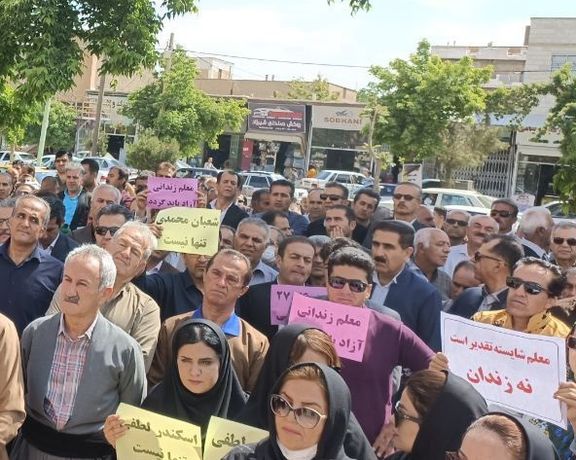
The world’s largest federation of teachers’ trade union has called for the freeing of 13 named teachers amid “dozens” jailed in Iran over demonstrations.
In a statement released Thursday, Brussels-based Education International condemned the arrests as “violations of freedom of association, the right to organize, and freedom of speech” and called for the “immediate and unconditional release” of those detained.
Among those named were Eskander Lofti, a member of the teachers’ union in Mariwan, Kurdistan province, and spokesperson for the Coordinating Council of Iranian Teachers’ Trade Association, which has organized the protests.
Given Iran’s inflation of at least 30 percent since United States ‘maximum pressure’ sanctions began in 2018, teachers like other Iranians have demanded higher salaries.
Their protests go back around two years, with recent demonstrations beginning in April. At least 28 were arrested in the build-up to protests planned for May 1. Iran also arrested May 7 Cecile Kohler, a French teaching union official in Iran with her husband.
The statement from Education International included a resolution from its executive board demanding respect for rights of education workers to organize and peacefully assemble.
The federation also called for the release of Esmail Abdi, former leader of the Tehran Teacher Association, who is in jail over “collusion against national security” with release not due until 2031 and who on May 1 began a hunger strike. Education International called his charges “trumped up” and said his “long imprisonment and ill treatment” had “severely affected his health.”
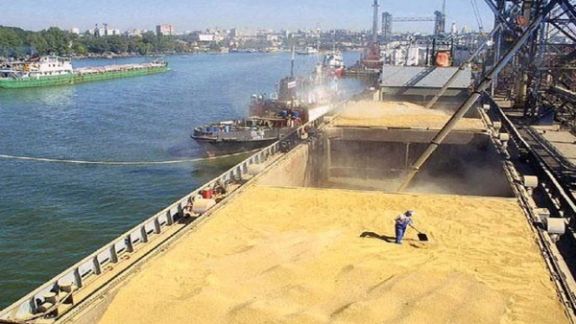
Following the sharp rise in food prices, such as vegetable oil, flour, chicken, eggs, and dairy products in Iran, the prices of animal feed have also increased five to sixfold.
The head of Cattle Farmers Association, Ahmad Moghaddasi, told ILNA on Saturday that the price of barley, corn, and soybean meal have risen from less than 10 cents to about 60 cents per kilogram.
He added that the jump in the feed prices has also increased the price of live cattle by nearly 20 percent.
Soybean meal, barley and corn for livestock and chicken feed are mainly imported from Russia and other countries. Iran annually imports around 8 million metric tons of corn, 4.2 million metric tons of soybean meal, and 400,000 metric tons of barley for animal feed. Any shortages or higher prices can push up the price of meat further.
The head of the Flour Producers Association says this year Iran must import 20 million tons of grain – including 6 to 7 million tons of wheat -- noting that the country has never been so dependent on imports.
Anti-government unrest in Iran triggered by the sudden rise in food prices spread further on Saturday as state media and officials are in denial.
The average price of food for one person is estimated to be about 9,030,000 rials (about $30) per month and for a family of four it is about 36,120,000 rials (about $120). Considering the average minimum wage that is set at about 42,000,000 to 63,000,000 rials this year (about $140 to $200), a family of three to four must spend more than 85 percent of its income on food.